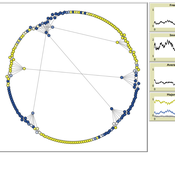
Jiin Jung
Affiliations Personal homepage Professional homepagehttps://sites.google.com/lehigh.edu/group-dynamics-social-change/
ORCID more infohttps://orcid.org/0000-0002-4372-2930
GitHub more infoNo associated GitHub account.
Dr. Jiin Jung is a social psychologist and Assistant Professor in the Department of Psychology at Lehigh University. She also serves Secretary of the Computational Social Science of the Americas. Dr. Jung’s research focuses on how minority voices influence society and drive changes in social norms and cultural practices. She directs the Group Dynamics & Social Change Lab, which is dedicate to investigating psychological explanations for social change. Her lab explores topics such as minority influence on social change, minority responses to identity uncertainty and threat, and minority contributions to collective adaptation. Dr. Jung engages in policy initiatives geared toward democracy and gender equity.
Research Interests
Minority Influence on Social Change
Computational Social Psychology
Social Innovation Model
Jiin Jung | Published Monday, April 28, 2025This research aims to uncover the micro-mechanisms that drive the macro-level relationship between cultural tolerance and innovation. We focus on the indirect influence of minorities—specifically, workers with diverse domain expertise—within collaboration networks. We propose that minority influence from individuals with different expertise can serve as a key driver of organizational innovation, particularly in dynamic market environments, and that cultural tolerance is critical for enabling such minority-induced innovation. Our model demonstrates that seemingly conflicting empirical patterns between cultural tightness/looseness and innovation can emerge from the same underlying micro-mechanisms, depending on parameter values. A systematic simulation experiment revealed an optimal cultural configuration: a medium level of tolerance (t = 0.6) combined with low consistency (κ = 0.05) produced the fastest adaptation to abrupt market changes. These findings provide evidence that indirect minority influence is a core micro-mechanism linking cultural tolerance to innovation.
An Agent-Based Model of Indirect Minority Influence on Social Change
Jiin Jung | Published Wednesday, February 05, 2025This model demonstrates how different psychological mechanisms and network structures generate various patterns of cultural dynamics including cultural diversity, polarization, and majority dominance, as explored by Jung, Bramson, Crano, Page, and Miller (2021). It focuses particularly on the psychological mechanisms of indirect minority influence, a concept introduced by Serge Moscovici (1976, 1980)’s genetic model of social influence, and validates how such influence can lead to social change.
Under development.

